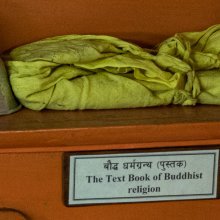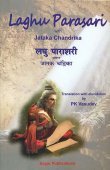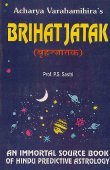Grantha, Gramtha: 18 definitions
Introduction:
Grantha means something in Buddhism, Pali, Hinduism, Sanskrit, Marathi. If you want to know the exact meaning, history, etymology or English translation of this term then check out the descriptions on this page. Add your comment or reference to a book if you want to contribute to this summary article.
Images (photo gallery)
(+5 more images available)
In Hinduism
Shaktism (Shakta philosophy)
Source: Google Books: ManthanabhairavatantramGrantha (ग्रन्थ) refers to the “(Kula) scripture”, according to the Ṣaṭsāhasrasaṃhitā, an expansion of the Kubjikāmatatantra: the earliest popular and most authoritative Tantra of the Kubjikā cult.—Accordingly, “Again, the one who pierces the mind (with the energy of grace) is a (true) teacher. He should awaken the unawakened to the Kula scripture (grantha) by means of good languages (subhāṣā). The one who can explain the (yogic states known as) ‘Established in the Body’, ‘Established on the Plane’ and the procedure related to (the ritual offering) of bodily substances—what is supreme, subtle and gross—is a (true) teacher. (Caste is) no consideration, (whatever he be,) starting from a Brahmin to an outcaste. Indeed, the teacher is one whose action (ritual and yogic) is such is said to be a Brahmin (vipra—regardless of his caste)”.

Shakta (शाक्त, śākta) or Shaktism (śāktism) represents a tradition of Hinduism where the Goddess (Devi) is revered and worshipped. Shakta literature includes a range of scriptures, including various Agamas and Tantras, although its roots may be traced back to the Vedas.
Yoga (school of philosophy)
Source: ORA: Amanaska (king of all yogas): A Critical Edition and Annotated Translation by Jason BirchGrantha (ग्रन्थ) refers to “texts” (e.g., for studying yoga or philosophy), according to the Amanaska Yoga treatise dealing with meditation, absorption, yogic powers and liberation.—Accordingly, as Īśvara says to Vāmadeva: “[...] Some who are full of pride because they know a multitude of scriptures, do not know the [true] teaching, not even by [studying] hundreds of texts (grantha-śata). [Because their minds] are agitated by hundreds of conceptual processes consisting of meditation and so forth, [all of which are] grounded in desire [for some particular reward], they do not find the desired state that is to be obtained, however hard they torture [themselves]. [...]”.

Yoga is originally considered a branch of Hindu philosophy (astika), but both ancient and modern Yoga combine the physical, mental and spiritual. Yoga teaches various physical techniques also known as āsanas (postures), used for various purposes (eg., meditation, contemplation, relaxation).
General definition (in Hinduism)
Source: archive.org: A History of Indian PhilosophyA verse containing thirty-two letters is called a grantha.
In Buddhism
General definition (in Buddhism)
Source: Wisdom Library: Dharma-samgrahaGrantha (ग्रन्थ) or Granthadhāraṇī refers to “the rentention of a book” and represents the “four retentions” (dhāraṇī) as defined in the Dharma-saṃgraha (section 52). The Dharma-samgraha (Dharmasangraha) is an extensive glossary of Buddhist technical terms in Sanskrit (e.g., grantha). The work is attributed to Nagarjuna who lived around the 2nd century A.D.
Languages of India and abroad
Marathi-English dictionary
Source: DDSA: The Molesworth Marathi and English Dictionarygrantha (ग्रंथ).—m (S) A book or composition in prose or verse. 2 Stringing together, connecting, composing, lit. fig. 3 A book, a part, a division or section of a book. 4 A metre or a metrical line of thirty-two syllables. 5 fig. A design, plan, scheme, arrangement. granthācī granthāntara ṭīkā One book explains another.
Source: DDSA: The Aryabhusan school dictionary, Marathi-Englishgrantha (ग्रंथ).—m A book or composition in prose or verse. Composing. Fig. A design.
Marathi is an Indo-European language having over 70 million native speakers people in (predominantly) Maharashtra India. Marathi, like many other Indo-Aryan languages, evolved from early forms of Prakrit, which itself is a subset of Sanskrit, one of the most ancient languages of the world.
Sanskrit dictionary
Source: DDSA: The practical Sanskrit-English dictionaryGrantha (ग्रन्थ).—[granth saṃdarbhe bhāve ghañ]
1) Binding, stringing together (fig. also).
2) A work, treatise, composition, literary production, book; ग्रन्थारम्भे, ग्रन्थकृत्, ग्रन्थसमाप्ति (granthārambhe, granthakṛt, granthasamāpti) &c.
3) Wealth, property.
4) A verse consisting of 32 syllables, written in the Anuṣṭubh metre.
Derivable forms: granthaḥ (ग्रन्थः).
Source: Cologne Digital Sanskrit Dictionaries: Edgerton Buddhist Hybrid Sanskrit DictionaryGrantha (ग्रन्थ).—m. (= Pali gantha; Sanskrit uses granthi, but [Page218-b+ 71] not grantha, in much the same way; compare prec. and next), bond, fetter (to worldly life): Mahāvyutpatti 2145 = Tibetan mdud pa, knot; context indicates fig. (religious) application.
Source: Cologne Digital Sanskrit Dictionaries: Shabda-Sagara Sanskrit-English DictionaryGrantha (ग्रन्थ).—m.
(-nthaḥ) 1. Stringing or tying together, (literally or metaphorically.) 2. Wealth, property. 3. A book or composition in prose or verse. 4. A metre or measure of thirty two syllables. E. grantha to dispose or arrange, affix bhāve karmaṇi vā ghañ .
Source: Cologne Digital Sanskrit Dictionaries: Benfey Sanskrit-English DictionaryGrantha (ग्रन्थ).—[granth + a], m. 1. A literary composition, a book, [Rāmāyaṇa] 2, 108, 16; Mahābhārata 12, 11340. 2. Wealth, [Pañcatantra] i. [distich] 12.
Source: Cologne Digital Sanskrit Dictionaries: Cappeller Sanskrit-English DictionaryGrantha (ग्रन्थ).—[masculine] arranging of words, composition, text, chapter, section.
Source: Cologne Digital Sanskrit Dictionaries: Monier-Williams Sanskrit-English Dictionary1) Grantha (ग्रन्थ):—[from granth] m. tying, binding, stringing together, [cf. Lexicographers, esp. such as amarasiṃha, halāyudha, hemacandra, etc.]
2) [v.s. ...] = thi, a knot, [Taittirīya-saṃhitā vi, 2, 9, 4] ([varia lectio])
3) [v.s. ...] honeycomb, [Pāṇini 4-3, 116], [vArttika]
4) [v.s. ...] an artificial arrangement of words ([especially] of 32 syllables = śloka, [Jaina literature]), verse, composition, treatise, literary production, book in prose or verse, text (opposed to artha ‘meaning’ [Varāha-mihira’s Bṛhat-saṃhitā; Vākyapadīya; Sarvadarśana-saṃgraha]), [Nirukta, by Yāska i, 20; Pāṇini; Mahābhārata; Upaniṣad] etc.
5) [v.s. ...] a section (of, [Kāṭhaka])
6) [v.s. ...] the book or sacred scriptures of the Sikhs containing short moral poems by Nānak Ṣāh and others (cf. [Religious Thought and Life in India] pp. 158-177)
7) [v.s. ...] wealth, property, [Jaina literature [Scholiast or Commentator]] (cf. uttara-, nir-, ṣaḍ-.)
Source: Cologne Digital Sanskrit Dictionaries: Yates Sanskrit-English DictionaryGrantha (ग्रन्थ):—(nthaḥ) 1. m. Stringing; wealth; a metre.
Source: DDSA: Paia-sadda-mahannavo; a comprehensive Prakrit Hindi dictionary (S)Grantha (ग्रन्थ) in the Sanskrit language is related to the Prakrit words: Gaṃtha, Guṃdha.
[Sanskrit to German]
Sanskrit, also spelled संस्कृतम् (saṃskṛtam), is an ancient language of India commonly seen as the grandmother of the Indo-European language family (even English!). Closely allied with Prakrit and Pali, Sanskrit is more exhaustive in both grammar and terms and has the most extensive collection of literature in the world, greatly surpassing its sister-languages Greek and Latin.
Kannada-English dictionary
Source: Alar: Kannada-English corpusGraṃtha (ಗ್ರಂಥ):—
1) [noun] the act of tying, binding together.
2) [noun] a literary, philosophical, scientific work, anthology, etc. so prepared, distinguished by length and form from a magazine, tract, etc.; a treatise, a book.
3) [noun] a formal, systematic written article or book on some subject, esp. a discussion of facts, evidence or principles and the conclusions based on these; a treatise.
4) [noun] the holy scriptures of any religion.
5) [noun] any of the four Vēdās, sacred books of Hindus.
6) [noun] a verse in the meter anuṣṭuppu, in which each foot has eight letters.
7) [noun] a set of thirty-two syllables.
8) [noun] the Tamiḷ alphabet system adapted as to be able to write Saṃskřta words as per their original pronunciations.
9) [noun] knowledge of excellent or worthy subject or subjects.
10) [noun] (math.) the number which is divided or to be divided by another.
Kannada is a Dravidian language (as opposed to the Indo-European language family) mainly spoken in the southwestern region of India.
See also (Relevant definitions)
Starts with (+26): Gramthabhamdara, Gramthabhamdari, Gramthakarta, Gramthakitaka, Gramthakshara, Gramthalaya, Gramthalekhaka, Gramthalipi, Gramthapala, Gramthapata, Gramtharacane, Gramtharina, Gramthasampadane, Gramthasuci, Gramthasvamya, Granthadharani, Granthakara, Granthakarana, Granthakartar, Granthakartri.
Ends with (+146): Abhinamdanagramtha, Adhikritagramtha, Adigrantha, Agnigrantha, Agrantha, Akankshagrantha, Akaragrantha, Alamkaragrantha, Alankaragrantha, Ankagrantha, Anupragrantha, Anushthanagrantha, Aryabhatatulyakaranagrantha, Asadharanagrantha, Ashtagrantha, Asiddhasiddhantagrantha, Aurvakalpagrantha, Aushadhagrantha, Aushadhakalpagrantha, Avadhutagrantha.
Full-text (+292): Granthakara, Granthakuti, Granthavistara, Agnigrantha, Granthasamdhi, Nirgrantha, Granthakrit, Cakradattanamako grantha, Anubrahmana, Granthakarttri, Sutragrantha, Tarkagrantha, Shadgrantha, Gramta, Gramthalipi, Gramthakshara, Vararuca, Agrantham, Prakarana, Varenya.
Relevant text
Search found 72 books and stories containing Grantha, Gramtha, Graṃtha; (plurals include: Granthas, Gramthas, Graṃthas). You can also click to the full overview containing English textual excerpts. Below are direct links for the most relevant articles:
Varahi Tantra (English Study) (by Roberta Pamio)
Taittiriya Upanishad Bhashya Vartika (by R. Balasubramanian)
Verse 1.171 < [Book 1 - Śīkṣāvallī]
Atithi or Guest Reception (study) (by Sarika. P.)
Part 10 - Prayogas (performance of rituals) < [Chapter 5 - The Dharmaśāstra Literature]
Puranic encyclopaedia (by Vettam Mani)
Expiatory Rites in Keralite Tantra (by T. S. Syamkumar)
4.2. Diseases and Expiatory Rites < [Chapter 1 - Expiatory Rites: Concept and Evolution]
1.5. Expiatory Rites in Mātṛsadbhāva < [Chapter 3 - Expiatory Rites in Kerala Tantric Ritual Manuals]
Vakyapadiya of Bhartrihari (by K. A. Subramania Iyer)
Verse 1.82 < [Book 1 - Brahma-kāṇḍa (or Āgama-samuccaya)]
Related products









